A Tale of Two Hives
Air Date: Week of June 13, 2008
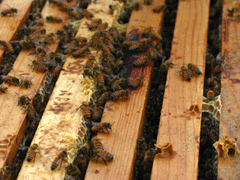
Helen Palmer's bees.
Living on Earth’s Helen Palmer is a self-proclaimed “incompetent” beekeeper but recently, something miraculous happened to her hives. She says she owes it all to her queen bee, Victoria.
Transcript
PALMER: I have two bee hives on my back deck.
GELLERMAN: That’s our managing producer, Helen Palmer, who came into work this week and told us a story with a sweet ending.
PALMER: Over the winter, the bees in one of my hives died. No, it probably wasn’t colony collapse disorder – that’s much more a problem for commercial bee-keepers, who truck their bees up and down the country than for hobbyists like me.
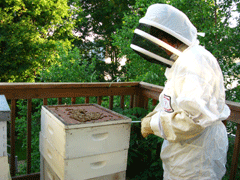
Helen Palmer timidly approaches her hive.(Courtesy of Helen Palmer)
Then I cleaned it out and it seemed such a waste that I changed my mind. Too late – I told you I was incompetent. In April and May you can order three pound packages of bees from lots of breeders; they arrive in the mail. But by June – everybody’s sold out!
Now there is another way of filling an empty hive. You can steal bee-eggs – they’re called brood – from a healthy hive and relocate them. A hive’s kind of like a file cabinet with hanging folders. The queen bee – I call mine Victoria – lays eggs in honeycomb cells that the worker bees build on these folders – they’re called frames.
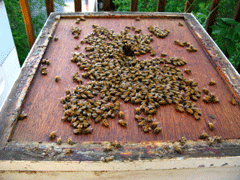
Helen's hives.
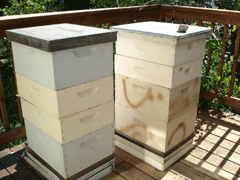
(Courtesy of Helen Palmer)
So to restock a hive you take about three frames and the bees that are hanging out on them and put them in the other hive. Then you order up another queen – they’re shipped overnight from Georgia – and put her into that hive. She lays lots more eggs, and builds up the strength of the colony. But there’s a snag: the bees aren’t too happy when you invade their home and steal their babies, - they tend to attack very aggressively and, as I told you, I’m scared of bees.
Still I was game to take some frames from my healthy hive—it’s just a foot away from the dead one. Then events – or rather the bees - took the decision out of my hand. About nine o’clock last Saturday, suddenly, outside on the deck, the air was thick with bees – bees zooming and buzzing frantically – a whirlwind of bees stretching way up into the sky and way out across the garden. And then – almost as soon as the commotion had started – the swarm was gone. Half the hive just flew off and away.
Now, it’s not actually uncommon – if bees feel they need more space, they DO swarm – but I was dejected. Queen Victoria was gone - my healthy hive was only at half strength – and there was no way I could take brood away from it to repopulate the dead hive. But I was relieved too, I suppose. I mean even if I’d harvest much less honey, at least I wouldn’t have to fight the angry bees.
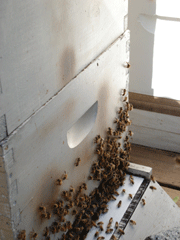
(Courtesy of Helen Palmer)
But the more I thought about it the more logical it became. I may be an incompetent beekeeper, but bees have been creating colonies, raising brood, and making honey for millennia. They think as one organism – it’s called hive mind. And I have to believe that these bees of mine understood my shortcomings, and took pity on me.
They knew I couldn’t possibly manage to resurrect the dead hive – that I’d squash plenty of them trying and they’d have to sting me – so they saved us all the pain and trouble. So thank you Queen Victoria! I promise not too take too of your much honey!
GELLERMAN: When Helen Palmer isn’t tending her bees – she’s producing our program.
Living on Earth wants to hear from you!
Living on Earth
62 Calef Highway, Suite 212
Lee, NH 03861
Telephone: 617-287-4121
E-mail: comments@loe.org
Newsletter [Click here]
Donate to Living on Earth!
Living on Earth is an independent media program and relies entirely on contributions from listeners and institutions supporting public service. Please donate now to preserve an independent environmental voice.
NewsletterLiving on Earth offers a weekly delivery of the show's rundown to your mailbox. Sign up for our newsletter today!
 Sailors For The Sea: Be the change you want to sea.
Sailors For The Sea: Be the change you want to sea.
 Creating positive outcomes for future generations.
Creating positive outcomes for future generations.
 Innovating to make the world a better, more sustainable place to live. Listen to the race to 9 billion
Innovating to make the world a better, more sustainable place to live. Listen to the race to 9 billion
 The Grantham Foundation for the Protection of the Environment: Committed to protecting and improving the health of the global environment.
The Grantham Foundation for the Protection of the Environment: Committed to protecting and improving the health of the global environment.
 Contribute to Living on Earth and receive, as our gift to you, an archival print of one of Mark Seth Lender's extraordinary wildlife photographs. Follow the link to see Mark's current collection of photographs.
Contribute to Living on Earth and receive, as our gift to you, an archival print of one of Mark Seth Lender's extraordinary wildlife photographs. Follow the link to see Mark's current collection of photographs.
 Buy a signed copy of Mark Seth Lender's book Smeagull the Seagull & support Living on Earth
Buy a signed copy of Mark Seth Lender's book Smeagull the Seagull & support Living on Earth

